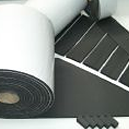The Importance of Electrical Sealing Tapes for Your Safety
- 6 October 2015
- Posted by: Kim M
- Category: Article
 It’s not the voltage that gets you, it’s the current. These and other rules set electrical installations aside as a hazardous and sometimes hard to fathom industry. One thing’s for certain, if we see an exposed wire, we all know the potential for serious harm exists. Electrical sealing tapes eliminate this threat by delivering a primary or supplemental insulating barrier, one that’s designed to prevent electrical shocks and short-circuits. But, more than this, high-quality electrical tapes provide other handy features that target electrical cables, even when that cable is located below ground. The seal is specially formulated to offer advanced insulating characteristics, meaning it has a superior dielectric strength, and features that target the safe installation, repair, and maintenance of electricity-carrying components.
It’s not the voltage that gets you, it’s the current. These and other rules set electrical installations aside as a hazardous and sometimes hard to fathom industry. One thing’s for certain, if we see an exposed wire, we all know the potential for serious harm exists. Electrical sealing tapes eliminate this threat by delivering a primary or supplemental insulating barrier, one that’s designed to prevent electrical shocks and short-circuits. But, more than this, high-quality electrical tapes provide other handy features that target electrical cables, even when that cable is located below ground. The seal is specially formulated to offer advanced insulating characteristics, meaning it has a superior dielectric strength, and features that target the safe installation, repair, and maintenance of electricity-carrying components.
Almost every adhesive tape made today can offer some amount of insulation to electricity, well, apart from the special brands that are lined with metal and fabric. Those are designed for use in plumbing work and other areas where high mechanical integrity is needed. These types of materials are obviously not manufactured for this application and they possess no electrical insulating properties, but some plastic or rubber sealing tapes are also unsuitable. It’s just that it’s harder to discern why they’re not designed for this purpose. That’s why it’s best to always buy electrical sealing tapes if the job involves electricity, either directly or indirectly. For example, we’ve already mentioned dielectric strength. This single property is quoted as a numerical value, a figure that illustrates how well the tape insulates when the voltage carried by the cabling begins to climb.
Finally, electrical sealing tapes are designed to be as mechanically robust as their commonplace cousins. In fact, they’re better. The tape can’t sag or shrink because this deteriorating effect would expose a hazardous electrical conductor. A careless finger could then touch the exposed wire and cause a dangerous short-circuit through the human body. In other words, the potential for electrocution exists when the tape exposes the electrical carrier. Therefore, the seal must always be sound and inviolable. Adhesion is understandably important in this scenario, as is the aforementioned dielectric strength. The tacky pressure contact formulation will have to be weatherproof if the tape is used outdoors, and the actual tape thickened to increase the insulating characteristics of the product. No perforations of any kind can be afforded here, which is why dielectric properties are compounded by superior mechanical strength.
Heat, acid, and humidity resistant, the hallmarks of a top sealing electrical tape are dictated by its UL and CSA listing placement.

